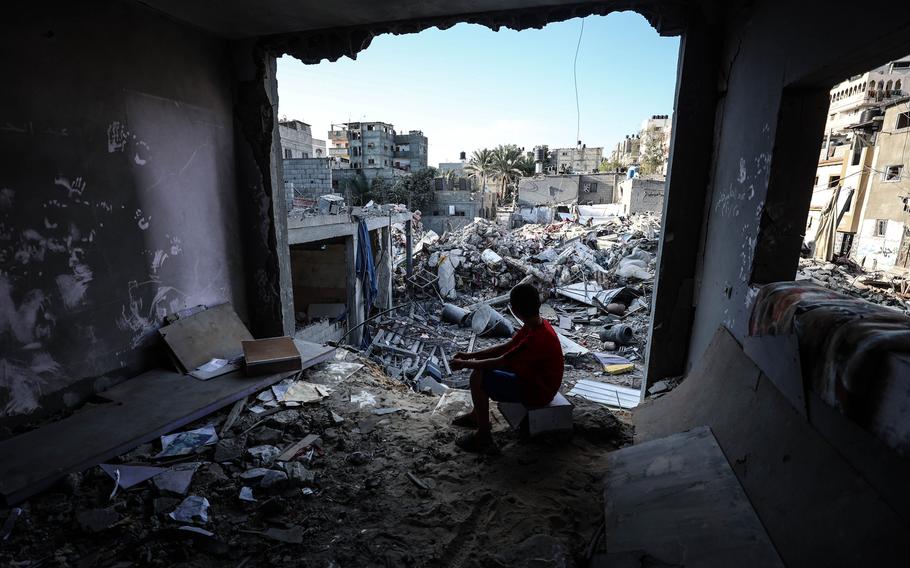
A child sits among rubble on Oct. 30, 2023, after Israeli airstrikes targeted Khan Younis in southern Gaza. (Loay Ayyoub/for The Washington Post)
The carnage in Kfar Aza was indelible. Villagers shot dead in the streets. Bodies set on fire.
Menachem Isseroff, a 29-year-old from Brooklyn, was among the Israeli soldiers dispatched to the kibbutz where Hamas militants, having massacred dozens, staged a raging battle amid their surprise cross-border assault. He described the barbarity as “absolutely horrific,” adding, “Any one of those individual scenes would ... last most people a lifetime.”
Thousands of miles away in New York, his younger sister Shterny was celebrating the Jewish holiday Simchat Torah. As she learned what had happened, her perspective darkened, too — though for different reasons: The Israeli government, she was sure, would use the atrocities committed by Hamas on Oct. 7 as “justification” for carrying out “acts of violence against the Palestinian people.”
“War crimes, even,” she said.
The Isseroffs are among thousands of Americans with ties to the Israeli military as it prosecutes a fierce, divisive retaliatory war in Gaza. Weeks of aerial bombardment and an ensuing ground offensive — both now temporarily paused to enable an exchange of hostages and prisoners — have killed thousands of children and other civilians in the Palestinian enclave. With neighborhoods leveled, hospitals crippled, and food, fuel and medical supplies scarce, the crisis has torn at some families, and those directly involved have pondered difficult questions about the cause they have joined.
About 10,000 people living in the United States have reported for Israeli military duty after receiving draft notices, part of a larger mobilization of 360,000 troops, Israeli officials told The Washington Post. At least eight U.S. citizens have been killed while serving in Israeli security forces since the war began, according to the State Department.
The rush of U.S. citizens willing to take up arms for Israel resembles, in ways, the early days of Russia’s full-scale invasion of Ukraine, whose government appealed to Americans and other foreign nationals to help repel the incursion now nearing the start of its third year. But there are differences, too.
In this case, most of the Americans who have joined the war effort have served previously in the Israel Defense Forces or remain IDF reservists. Historically, about 1,200 Americans serve in the IDF at a given time, according to a study published last year by the journal Sociological Forum. Many are, or become, dual citizens.
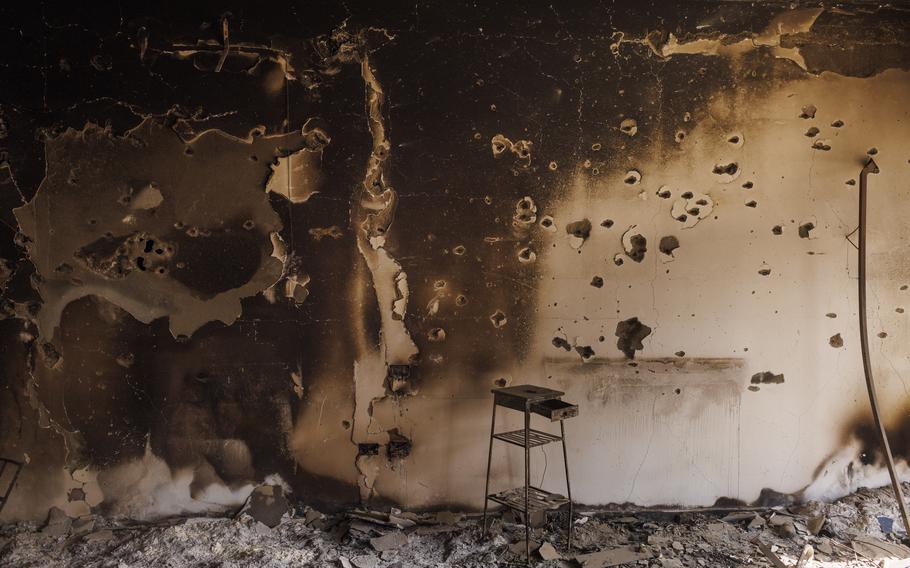
Bullet holes scar the walls of a burned house in Kibbutz Beeri, Israel, on Nov. 2, 2023. (Kobi Wolf/for The Washington Post)
In interviews, IDF veterans and reservists who have left behind their American lives described feeling galvanized by the deadliest attack on the Jewish people since the Holocaust, even as the ferocity of Israel’s response draws scrutiny and some have begun to wonder about the war’s outlook beyond the Israeli government’s stated goal of destroying Hamas.
“It’s really not clear to any of us how this is going to play out long-term,” Isseroff said, referring to fellow members of the 55th Paratroopers Brigade. “... You hope that the people who are telling you what to do have a good grasp on the bigger picture.”
They’ve put their trust, he said, in the belief that there is good in fighting to ensure nothing so ghastly can ever happen again.
‘Yes, people will die’
Brooklyn-born, Miami-raised Izzy Ezagui was in Los Angeles last month when the attack on Israel occurred.
His IDF service dates back more than a decade. In 2009, during the Israelis’ 22-day offensive into Gaza known as Operation Cast Lead, he was catastrophically wounded, losing his left arm when a mortar hit his base.
A sharpshooter, he fought to stay in the Israeli military, he said, by learning to cradle, fire and reload his rifle with one arm.
About three years ago, Ezagui, now 35, completed his duty, feeling, he said, like he was getting old for a soldier.
That changed in an instant last month, when he decided to leave his service dog, Punch, with family and pause his career in finance to rejoin the IDF.
“As a Jew, there is no better place to be than an IDF base,” he said. “There is no hopelessness here. I would be suffering if I stayed home.”
Soon after his reinstatement, he had a chance encounter with an officer he had known for years who offered Ezagui an assignment ferrying water and ammunition to units inside Gaza and then bringing the wounded back out. He characterized the nighttime missions as quick and chaotic, traversing foggy, narrow corridors where friendly-fire incidents had occurred.
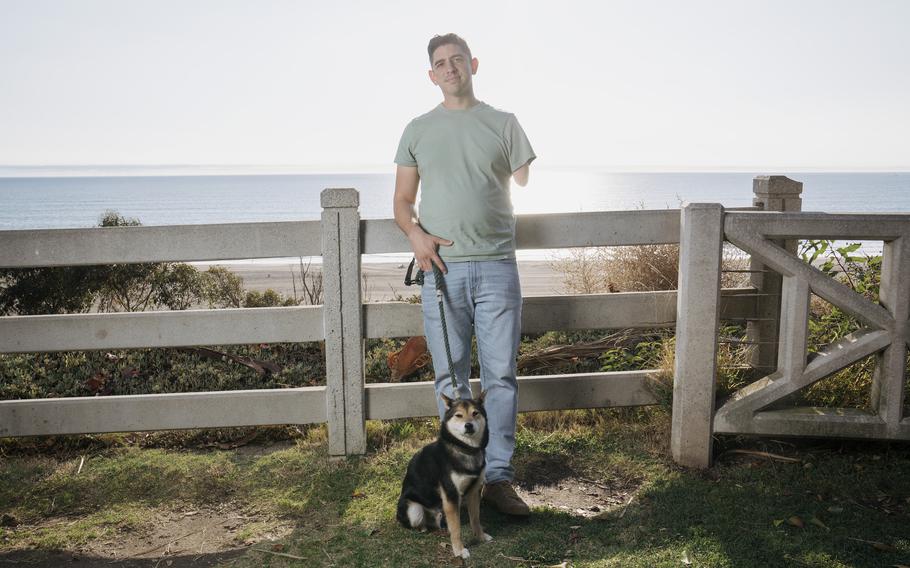
Izzy Ezagui with his dog, Punch, at Palisades Park in Santa Monica, Calif., on Nov. 16, 2023. (Eric Thayer/for The Washington Post)
Ezagui returned to Los Angeles on Nov. 7 to settle affairs at home, including, he said, identifying which of his family members will look after Punch. He volunteered for 10 more years of reserve duty, he said. The forms he signed asked the reason he wanted to extend his service.
Ezagui wrote two words, he said: “Kibbutz Beeri,” another of the Israeli villages where Hamas fighters rampaged. He appears resigned to the likelihood that there will be difficult and uncertain days ahead.
“Yes, people will die,” he said. “More Israelis will die. A lot of Palestinians will die. But what choice does Israel have?”
‘No room for skepticism’
Houston Mack, 33, lived in Israel for 10 years, earning citizenship before returning to the United States over the summer. As the magnitude of Hamas’ savagery came into view, IDF commanders directed his unit of reservists to prepare for action. The message was unambiguous, Mack recalled: “Get your bags. Grab your kit and show up to base immediately. We’re at war.”
Mack, a Los Angeles native who had settled in Las Vegas, rotated through a variety of assignments earlier in his Israeli military career, primarily in the West Bank, another Palestinian territory. As a reservist living in the United States, he was not obligated to return, he said. But he was moved to do so after watching videos of the Hamas assault.
In Tel Aviv, Mack said, there are shrines to those killed and taken hostage, some with teddy bears. He intends to stay as long as he is needed. His employer in the United States, a Marine Corps veteran, told Mack he will have a job waiting for him when he returns, he said.
Asked about the doubts held among some Americans over Israel’s prosecution of the war, Mack urged critics to remember that there is a long history of antisemitism and atrocities perpetuated against Jews.
“There is no room for skepticism. There are still people to this day that deny the Holocaust,” he said. “We’re here to defend our right to exist in front of an enemy that wants to destroy us.”
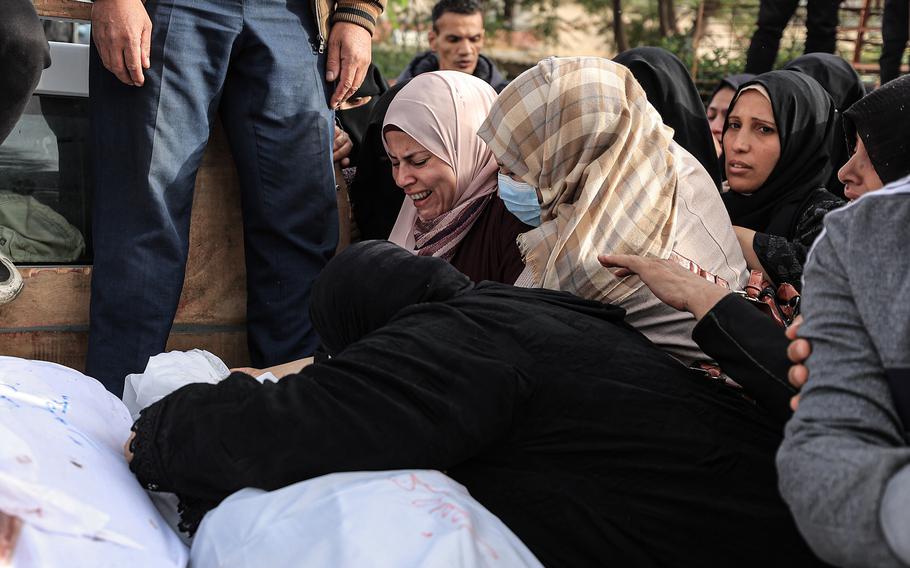
Palestinians mourn dead relatives outside a morgue in Khan Younis in southern Gaza on Nov. 19, 2023. (Loay Ayyoub/for The Washington Post)
A family divided
Shterny Isseroff sees things differently than her brother. She moved to Israel after high school, spending about five years there. But she left, she said, in part because she’d become troubled by the Israeli government’s treatment of Palestinians.
She did work in Israel opposing its occupation of Palestinian areas, she said, but also was disgusted to hear Palestinian friends celebrate after seeing footage of rockets hitting Israeli homes.
“Very often, people are looking for a good guy and a bad guy,” she said. “If anything, I have learned that this is complex and there is a long history and a lot of pain.”
Her brother Menachem also said he sees war as inherently bad. But he added that, as he sees it, there was no alternative after the Hamas attack. Israelis, he said, are “damned if we do and damned if we don’t,” forced between defending their homeland and contending with international criticism.
“The people of Gaza are not our enemies,” he said. “Hamas is our enemy.”
Shterny Isseroff said she worries about her brother and how he might process his military service years from now. It was his choice to be in the IDF, she said, and “he’s going to have to live with the consequences of his decisions.”
Menachem Isseroff said he and his sister care about each other deeply, but that they see the world differently. There’s a “large amount of human suffering and death that is happening in Gaza right now,” but it was set in motion by the attacks Hamas launched, he said. The militant group, he added, is glossing that over as it “cynically” highlights that suffering in the messaging that people like his sister internalize.
On a recent break from duty, Isseroff said, he visited his wife and their 2-year-old son, whom he left behind on Oct. 7. He was struck by his son asking him to sing “Shalom Aleichem,” a traditional song often sung as Jews mark Shabbat, their day of rest. Those singing it wish that “peace be upon you.”
“That’s what you ask for,” Isseroff said. “Every week, that’s all you ask for.”
The notion, he thought, seems far away.
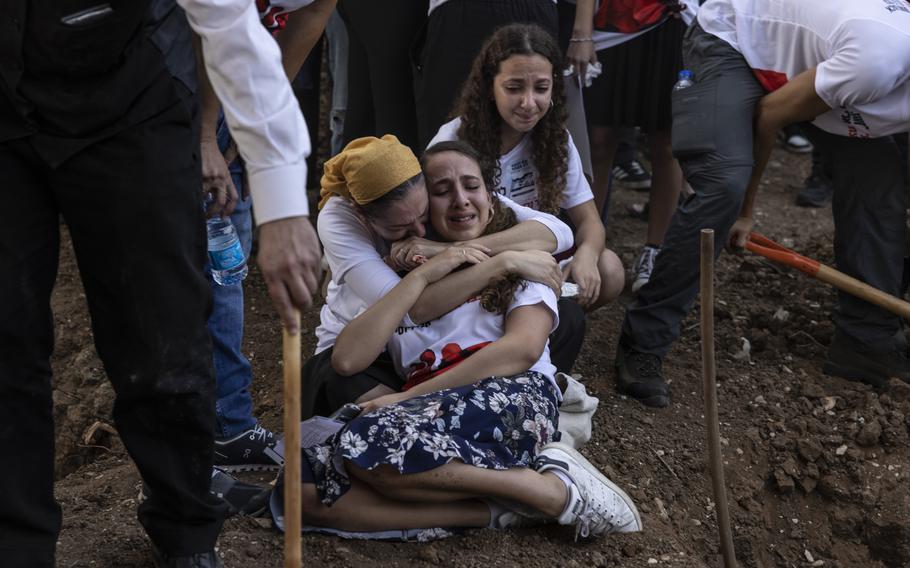
Relatives and friends grieve during a funeral in Kfar Harif, Israel, on Oct. 25, 2023. (Heidi Levine/for The Washington Post)